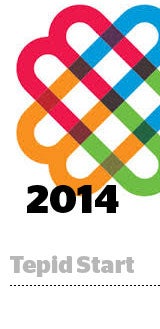 Here’s today’s AdExchanger.com news round-up… Want it by email? Sign-up here.
Here’s today’s AdExchanger.com news round-up… Want it by email? Sign-up here.
Amazon Q4 In
Although Amazon sales were up this holiday season as the company reported a 20% increase in revenue reaching $25.59 billion in Q4, the ecommerce giant still fell short of Wall Street estimates of $26.06 billion and shares plummeted 11% in after-hours trading. Amazon also announced it’s considering tacking on $30-$40 to a standing $70-plus Prime membership fee, the first increase the popular service with free shipping perks has seen in nine years. This, naturally, colored analysts’ questions on the Q4 earnings call. Although Amazon CFO Tom Szkutak acknowledged that tens of millions of “customers like the service and are using it a lot more,” the company is planning a price increase to offset the cost of shipping and “provide lasting value for shareholders.” Amazon, unsurprisingly, failed to detail any numbers on advertising services, which are grouped under “Other” revenues along with Amazon Web Services and cobranded credit cards. Notably, though, the “Other” category came in at $1.17 billion for the fourth quarter, a 52% increase from the $769 million recorded in 2012. How much of that $1.17 billion number is a result of advertising services is unclear, although eMarketer estimated they reached $835 million last year. Read the press release.
Ad Prognosis
Meredith Corp. is struggling with ad sales, both digitally and physically, the company revealed during its earnings call, according to WWD. “Calendar 2013 advertising performance was much stronger than calendar 2012, both for Meredith and for the industry in total. However, early calendar 2014 advertising appears to be off to a slow start. That said, industry experts are predicting full-year calendar 2014 magazine and digital advertising performance to resemble that experience in calendar 2013, the year just finished,” said CEO Stephen Lacy. Read the rest.
Everyone Wins
Nanigans is riding the wave of Facebook’s advertising success, with revenue per click up 83%, according to AllFacebook. In addition, CPMs and CPCs were both up year-over-year. Nanigans offered up some tips for the year ahead, saying, “To be successful in 2014, Facebook marketers must continue to embrace creative, targeting and optimization. In addition, retailers will continue to shift their focus to mobile users, consider video and invest in creative testing at scale.” Read more.
TV Wars
Shazam is encroaching on social TV territory, aiming to take some of Twitter and Facebook’s success for itself. With the Super Bowl coming up, the app developer hopes to lure users in by offering content feeds, and will appease advertisers by offering retargeting options through Facebook. “We have a lot of data that’s a very strong signal of interest,” CEO Rich Riley told Ad Age. “Leveraging that data to target advertising is a really big focus for 2014 on the ad side.” Read more.
Not Dead Yet
BlueCava, which has seen the ups and downs of ad tech life, has successfully raised $13 million according to a press release. Executive Chairman Phil Myers says, “This new round of capital will enable us to grow our business at the pace of the market that is opening up before us. (…) Our pipelines are healthy, and demand from customers to make ‘cross-screen first’ has intensified.” BlueCava will apparently jump back into the market that Experian’s AdTruth, Drawbridge, Tapad and others are aiming at. Next step is a CEO.
Namesake
Facebook’s Mark Zuckerberg was adamant from the inception of the social network that people have to use real names. That policy is changing for future apps, according to TechCrunch, as the site is going to ease up on username requirements. Although Zuckerberg believed using real names was a way of keeping people accountable and to ward off spamming, newcomers such as Snapchat have shown that the young audience prefers some level of anonymity. This shouldn’t have any real effect on the bottom line seeing as ad targeting is probably very rarely done by name. Read more.
Identity-Linked Data
A WSJ story sets out to answer how one family’s personal tragedy wound up on a piece of direct mail and finds a tangled web of retailers and data companies. The automation of data sharing and the splicing of information sources is partly responsible, it concludes. More.
On Industry Preview
- The Next Generation Sales Team – Mediabizbloggers
- In the “Great DMP Debate” The Winner Is Clear – BlueKai blog
- While The DMPs Fiddled, The Marketers Got Burned – Turn blog
Retirement
- Ex-Akamai CEO Joins Venture Firm – The Boston Globe
Agencies
- Xaxis Brings Ad World’s Most Advanced Cross-Channel Programmatic Brand Advertising Offering to UK Market With Debut of Xaxis Brand Suite – press release
- Publicis Groupe’s VivaKi Selects Innovid to Deliver Immersive Brand Experiences Through its Video Advertising Platform – press release
But Wait. There’s More!
- Zynga Makes Big Moves to Hasten Revival – The Wall Street Journal
- The Consumerization of Everything – Medium
- Jelli Launches First Programmatic Ad Platform For Radio Stations, Networks And Advertisers – press release
- InMobi Launches Native Ads Platform To Redefine Mobile Ad Experience For Users/ – Press release
- Incredible Labs Acquired By Yahoo, Mobile Assistant App Donna To Be Shut Down – TechCrunch
- One Kings Lane Raises $112 Million At A Nearly $1 Billion Valuation – Re/code













